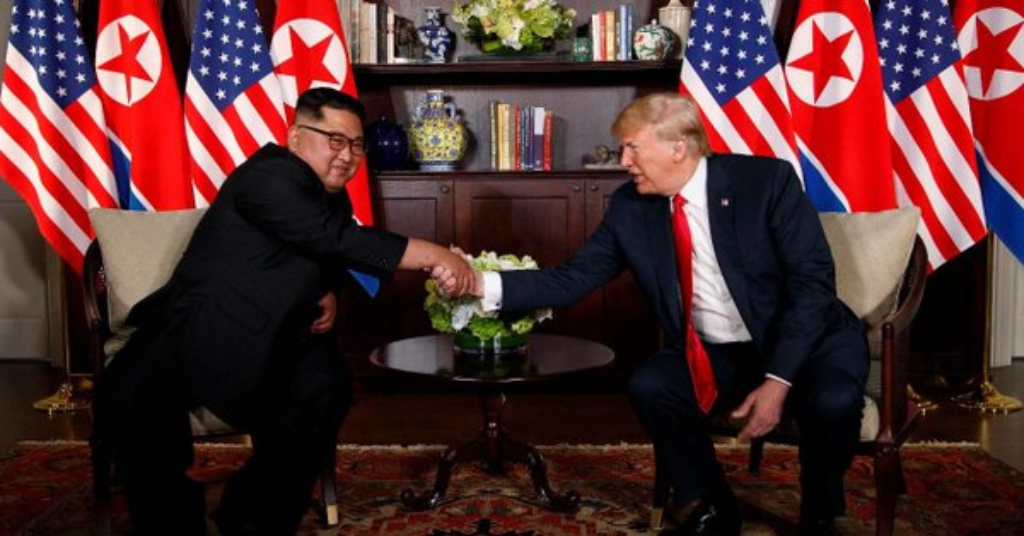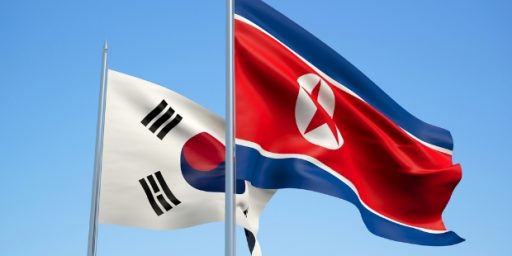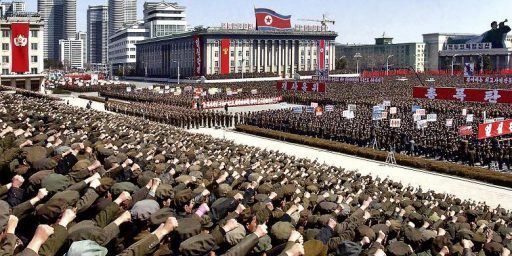A Reminder about North Korea
And a reminder about how little the current POTUS understands.
 Donald Trump, the 45th President of the United States: tweeted the following:
Donald Trump, the 45th President of the United States: tweeted the following:
North Korea, under the leadership of Kim Jong Un, will become a great Economic Powerhouse. He may surprise some but he won’t surprise me, because I have gotten to know him & fully understand how capable he is. North Korea will become a different kind of Rocket – an Economic one!
— Donald J. Trump (@realDonaldTrump) February 9, 2019
Human Rights Watch in their World Report 2017:
North Korea remains one of the most repressive authoritarian states in the world, ruled for seven decades by the Kim family and the Worker’s Party of Korea. During his fifth year in power, Kim Jong-Un continued to generate fearful obedience by using public executions, arbitrary detention, and forced labor; tightening travel restrictions to prevent North Koreans from escaping and seeking refuge overseas; and systematically persecuting those with religious contacts inside and outside the country.
[…]
The government practices collective punishment for alleged anti-state offenses, effectively enslaving hundreds of thousands of citizens, including children, in prison camps and other detention facilities. Detainees face deplorable conditions, sexual coercion and abuse, beatings and torture by guards, and forced labor in dangerous and sometimes deadly conditions.
[…]
UN officials estimate that between 80,000 and 120,000 people are imprisoned in political prison camps.
So, no, not conditions for the creation of an “Economic Powerhouse” nor an example of “great leadership.”
In regards to economics:
The government systematically uses forced labor from ordinary citizens to control its people and sustain its economy. A significant majority of North Koreans must perform unpaid labor at some point in their lives.
Former North Korean students who left the country told Human Rights Watch that their schools forced them to work for free on farms twice a year, for one month at a time, during ploughing and seeding time, and again at harvest time. A former school teacher who escaped North Korea in 2014 said his school forced its students (aged between 10 and 16) to work every day to generate funds to pay government officials, maintain the school, and make a profit.
Ordinary North Korean workers, both men and unmarried women, are required to work at government-assigned enterprises. Although they are theoretically entitled to a salary, they usually are not compensated. All North Korean families also have to send one family member for at least two hours per day, six days a week, to support local government construction or public beautification projects, like building structures, fixing roads, collecting raw materials like crushed stone, or cleaning public areas.
Slave labor is evil, plain and simple.
Freedom House reports from its 2018 assessment:
North Korea is a one-party state led by a dynastic totalitarian dictatorship. Surveillance is pervasive, arbitrary arrests and detention are common, and punishments for political offenses are severe. The state maintains a system of camps for political prisoners where torture, forced labor, starvation, and other atrocities take place. While some social and economic changes have been observed in recent years, including a growth in small-scale private business activity, human rights violations are still widespread, grave, and systematic.
In regards to property rights, FH notes:
The formal economy remains both centrally planned and grossly mismanaged. Business activity is also hobbled by a lack of infrastructure, a scarcity of energy and raw materials, an inability to borrow on world markets or from multilateral banks because of sanctions, lingering foreign debt, and ideological isolationism. However, expanding informal and government-approved private markets and service industries have provided many North Koreans with a growing field of activity that is relatively free from government control. Local officials have had some authority in the management of special economic zones and over small-scale experiments with market-oriented economic policies.
And in regards to economic rights:
Forced labor is common in prison camps, mass mobilization programs, and state-run contracting arrangements in which North Korean workers are sent abroad. There have been widespread reports of trafficked women and girls among the tens of thousands of North Koreans who have crossed into China. Due to changing economic conditions, prostitution has reportedly become common in North Korea itself in recent years.
Economic opportunity has been affected by escalating international sanctions in response to North Korea’s weapons tests and threats of military aggression. New sanctions imposed during 2017 targeted a variety of civilian industries such as textiles and seafood, and tightened banking restrictions to limit North Korea’s access to international financial institutions. Nevertheless, markets and quasi-private businesses have expanded over time. Agricultural reforms have allowed larger percentages of crop yields to be kept by households, presumably to either consume or sell in the markets.
None of this is going to lead to economic development by the North Koreans. Rather, this describes crimes against humanity on a mass scale. There is nothing to praise here.






Not to mention that North Korea has a lower GDP than any state in the United States.
Republicans reassure us because he hasn’t caused a catastrophe. This is equivalent to a principal who has let a drunk driver onto the playground at recess and points out that he hasn’t killed any kids yet
I don’t think the two are at all mutually exclusive. We already know he has no idea what he’s talking about, but we also know he has an open admiration for authoritarian leaders he thinks practice brutal efficiency. It is no exaggeration to say that the human cost of a country’s success means absolutely nothing to him–but it’s equally true that he has no understanding of what constitutes economic success.
North Korea is what you’d get if a medieval fiefdom had a kid with Stalin’s USSR and it were raised by Mao’s China.
Is anyone surprised Dennison wants to adopt it?
“Either our President actually admires one of the most brutal dictatorships currently in power”
I demand a recount! Trump admires several of the most brutal dictatorships currently in power, including The Philippines and Russia as well.
And this is just one of the reasons why it is quite plausible to believe the argument that he and his campaign have ties to Russia that helped him to get elected in the first place…
@Kathy: Interesting comparison. North Korea is arguably the poorest nation in modern history, including Ghana and Liberia, and Jong-eun is the child said to be most like his kleptocrat father and grandfather (with the possible exception of his sister, the propaganda minister [IIRC]). WA!
@Just nutha ignint cracker: Why are you picking on Ghana? They have had no wars nor any famines since independence and since throwing off the Soviet Union in the late 1980’s have experienced 1-2% evonomic growth (above population growth). Admittedly,it is still a poor country but not like it once was.
“What’s not to like?” -donald j. trump
Ah, come on. Don’t you get it? He’s playing 64-dimensional chess. He’s a student of Sun-Tzu!
While not slave labor, Famous Immigration Hawk Individual-1 has been using undocumented workers at his golf courses for years…paying them well below market wages, obviously. So it’s easy to see why he admires Kim, who is getting labor even cheaper!!!
Morality aside, the only way for the NK economy to grow is to sell cheap labor by opening up to foreign companies and foreign capital, which would doom the regime. I own furniture that understands NK better than Trump does.
@Just nutha ignint cracker:
In Medieval days, serfs worked the feudal lord’s fields, paid to use the lord’s mill and press, and owed unpaid labor to their lord for whatever he might require (though this tended to be seasonal). In exchange, the feudal lord was supposed to protect the serfs from attacks and raids, and had certain other obligations towards them (like dispensing justice, for example).
That’s what North Korea sounds like, but updated for modern times. Serfs were not free to leave their lands, either, or to travel without permission.